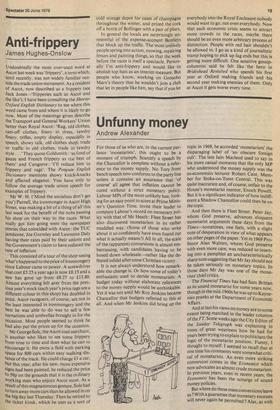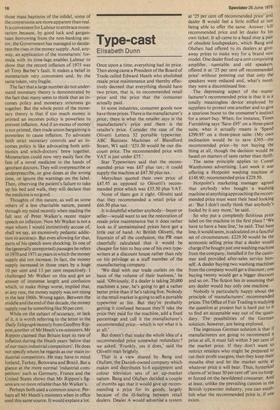Unfunny money
Andrew Alexander For those of us who are, in the current parlance 'monetarists', this ought to be a moment of triumph. Scarcely a speech by the Chancellor is complete without a reference to the money supply. No Tory front bench speech now conforms to the party line unless it contains an assurance that 'of course' all agree that inflation cannot be cured without a strict monetary policy. Labour MPs of the most unlikely hue, looking for an easy point to score at Prime Minister's Question Time, invite their leader to compare Labour's record on monetary policy with that of Mr Heath: Fleet Street has also discovered monetarism in its rather muddled way. (Some of those who write about it so confidently have even found out what it actually means!) All in all, the scale of the (apparent) conversions is almost embarrassing, with candidates having to be hosed down wholesale—rather like the defeated infidel after some Christian victory.
It is not always understood how remarkable the change is. Or how some of today's enthusiasts used to deride monetarism. A budget today without elaborate references to the money supply would be unthinkable. Yet it was not until Mr Roy Jenkins became Chancellor that budgets referred to this at all. And when Mr Jenkins did bring up the
topic in 1969, he accorded 'monetarism' the disparaging label of 'an obscure foreign cult'. The late lain Macleod used to say in his more casual moments that the only MP who understood the money supply was the ex-economics lecturer Robert Cant, Member for Stoke-on-Trent Central. This was quite inaccurate and, of course, unfair to the House's monetarist mentor, Enoch Powell. But it is a significant indicator of how indifferent a Shadow Chancellor could then be on the topic.
And then there is Fleet Street. Peter Jay, whom God preserve, advances eloquent monetarist arguments these days from the Times—sometimes, one feels, with a slight note of desperation in view of what appears on other pages of the paper. Yet in 1969 Professor Alan Walters, whom God preserve with even more care, was reduced to inserting into a pamphlet an uncharacteristically sharp notesuggesting that Mr Jay should not be taken seriously on monetary topics. In those days Mr Jay was one of the monerists' chief critics.
The Financial Times has had Sam Brittan as its sound monetarist for some years now, though in the mid-1960s he was up to Keynesian pranks at the Department of Economic Affairs.
And at last his views on money are to some extent being matched in the leader columns of the FT. Some weeks ago the City Editor of the Sunday Telegraph was explaining in tones of great weariness how he had for years been trying to explain to politicians the logic of the monetarist position. Funny, 1 thought to myself. I seemed to recall that at one time his comments were somewhat critical of monetarists. An even more striking conversion comes in the Economist which now advocates an almost crude monetarism. In previous years, even in recent years, the Economist has been the scourge of sound money policies.
But where do these mass conversions leave us ? With a guarantee that monetary excesses will never again be permitted ? Alas, as with those mass baptisms of the infidel, some of the conversions are more apparent than real. It is convenient for Labour to embrace monetarism because, by good luck and gargantuan borrowing from the non-banking sector, the Government has managed to decelerate the rises in the money supply. And, anyway, an application of the monetarists' formula with its time-lags enables Labour to show that the record inflation of 1975 was all Tony Barber's fault. It makes a belief in monetarism very convenient and, by the same token, very fragile.
The fact that a large number do not understand monetary theory is demonstrated by the fact that many seem to think that an incomes policy and monetary strictness go together. But the whole point of the monetary theory is that if too much money is printed an incomes policy is powerless to prevent inflation. And if an excess of money is not printed, then trade union bargaining is powerless to cause inflation. To advocate both strict monetary controls and an incomes policy is like advocating both antibiotics and witch-doctors' brew together. Monetarism could now very easily face the fate of a novel medicine in the hands of ignorant doctors. They will overprescribe or underprescribe, or give doses at the wrong time, or ignore the warnings on the label. Then, observing the patient's failure to take up his bed and walk, they will declare that the medicine is no good.
Thoughts of this nature, as well as some others of a less charitable nature, passed through my mind recently when reading the full text of Peter Walker's recent major speech on inflation. Now Mr Walker is not a man whom I would instinctively accuse of, shall we say, an excessively pedantic addiction to accuracy. But even allowing for that, parts of his speech were shocking. In one of the (generally unreported) passages he refers to 1970 and 1971 as years in which the money supply did not increase. In fact, the money supply increased in those years by a huge 10 per cent and 13 per cent respectively. I challenged Mr Walker on this and got an answer of immense length and confusion which, to make things worse, implied that, at any rate, the money supply was not rising in the late 1960s. Wrong again. Between the middle and the end of that decade, the money supply rose by something like 50 per cent.
While on the subject of accuracy, or lack of it, it is worth referring to the letter in the Daily Telegraph recently from Geoffrey R ippon, another of Mr Heath's ex-ministers. Mr Rippon claimed that Britain kept its rate of inflation during the Heath years 'below that of our main industrial competitors'. He does not specify whom he regards as our main industrial competitors. He may have in mind Iceland, Turkey, Botswana and Brazil. But a glance at the more normal 'industrial competitors' such as Germany, France and the United States shows that Mr Rippon's figures are no more reliable than Mr Walker's.
Perhaps both used a common source. Perhaps all Mr Heath's ministers when in office used this same source. It would explain a lot.















































 Previous page
Previous page